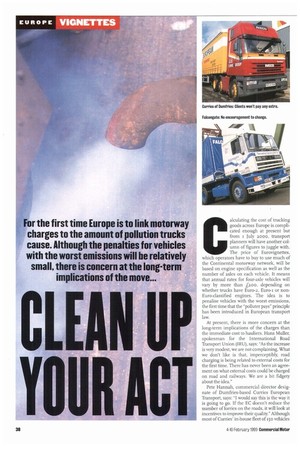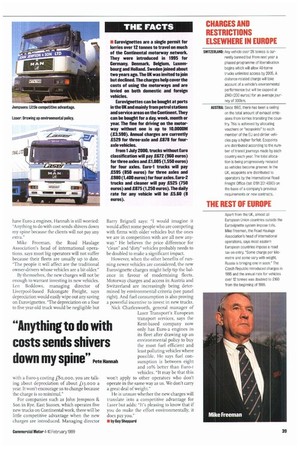CL
Page 40

Page 41

If you've noticed an error in this article please click here to report it so we can fix it.
Calculating the cost of trucking goods across Europe is complicated enough at present but from 1 July 2000, transport planners will have another column of figures to juggle with. The price of Eurovignettes, which operators have to buy to use much of the Continental motorway network, will be based on engine specification as well as the number of axles on each vehicle. It means that annual rates for four-axle vehicles will vary by more than Izoo, depending on whether trucks have Euro-a, Euro-1 or nonEuro-classified engines. The idea is to penalise vehicles with the worst emissions, the first time that the 'polluter pays" principle has been introduced in European transport law.
At present, there is more concern at the long-term implications of the charges than the immediate cost to hauliers. Hans Muller, spokesman for the International Road Transport Union (I RU), says: "As the increase is very modest, we are not complaining. What we don't like is that, imperceptibly, road charging is being related to external costs for the first time. There has never been an agreement on what external costs could be charged on road and railways. We are a bit fidgety about the idea."
Pete Hannah, commercial director designate of Dumfries-based Curries European Transport, says: "I would say this is the way it is going to go. If the EC doesn't reduce the number of lorries on the roads, it will look at incentives to improve their quality: Although most of Curries' in-house fleet of 150 vehicles
have Euro-2 engines, Hannah is still worried: "Anything to do with cost sends shivers down my spine because the clients will not pay any extra."
Mike Freeman, the Road Haulage Association's head of international operations, says most big operators will not suffer because their fleets are usually up to date. "The people it will affect are the traditional owner-drivers whose vehicles are a bit older."
By themselves, the new charges will not be enough to warrant investing in new vehicles. Len Beddows, managing director of Liverpool-based Falcongate Freight, says depreciation would easily wipe out any saving on Eurovignettes. "The depreciation on a four to five year-old truck would be negligible but
with a Euro-3 costing Lk,00cii, you are talking about depreciation of about i13,000 a year. It won't encourage us to change because the charge is so minimal."
For companies such as John Jempson Son in Rye, East Sussex, which operates five new trucks on Continental work, there will be little competitive advantage when the new charges are introduced. Managing director Barry Brignell says: "I would imagine it would affect some people who are competing with firms with older vehicles but the ones we are in competition with are all new anyway." He believes the price difference for "clean" and "dirty" vehicles probably needs to be doubled to make a significant impact.
However, when the other benefits of running newer vehicles are considered, the new Eurovignette charges might help tip the balance in favour of modernising fleets. Motorway charges and access in Austria and Switzerland are increasingly being determined by environmental criteria (see panel right). And fuel consumption is also proving a powerful incentive to invest in new trucks.
Nick Charlesworth, general manager of Laser Transport's European transport services, says the Kent-based company now only has Euro-2 engines in its fleet after drawing up an environmental policy to buy the most fuel efficient and least polluting vehicles where possible. He says Fuel consumption is between eight and to% better than Euro-t vehicles. "It may be that this won't apply to other operators who don't operate in the same way as us. We don't carry a great deal of weight."
He is unsure whether the new charges will translate into a competitive advantage for Laser but adds: "It's pleasing to know that if you do make the effort environmentally, it does pay you."
• by Guy Sheppard
CHARGES AND RESTRICTIONS ELSEWHERE IN EUROPE
SWITZERLAND: Any vehicle over 28 tonnes is currently banned but from next year a phased programme of liberalisation begins which will allow 40-tonne trucks unlimited access by 2005. A distance-related charge will take account of a vehicle's environmental performance but will be capped at 2140 1200 euros) for an average journey of 300km.
AUSTRIA: Since 1993, there has been a ceiling On the total amount of exhaust emissions from lorries transiting the country. This is achieved by allocating vouchers or "ecopoints" to each member of the EU and dirtier vehicles pay a higher forfeit. Ecopoints are distributed according to the number of transit journeys made by each country each year. The total allocation is being progressively reduced as vehicles become greener. In the UK, ecopoints are distributed to operators by the International Road Freight Office (tel: 0191 201 4090) on the basis of a company's previous requirements or new contracts.
THE REST OF EUROPE
Apart from the UK. almost all European Union countries outside the Eurovignette system impose tolls. Mike Freeman, the Road Haulage Association's head of international operations, says most eastern European countries impose a road tax on entry. "Some charge per kilometre and some vary with weight. Russia is bringing one in soon." The Czech Republic introduced charges in 1995 and the annual rate for vehicles over 12 tonnes was doubled to £160 from the beginning of 1999.








































































































